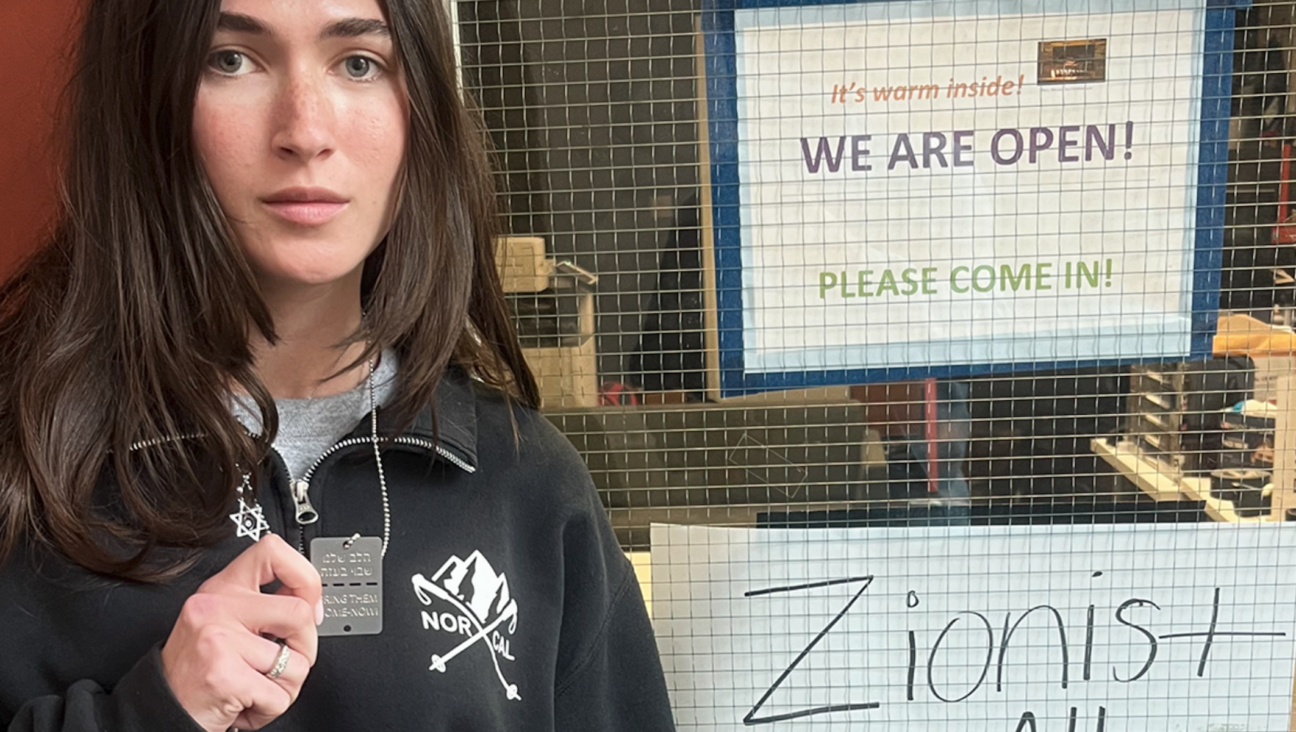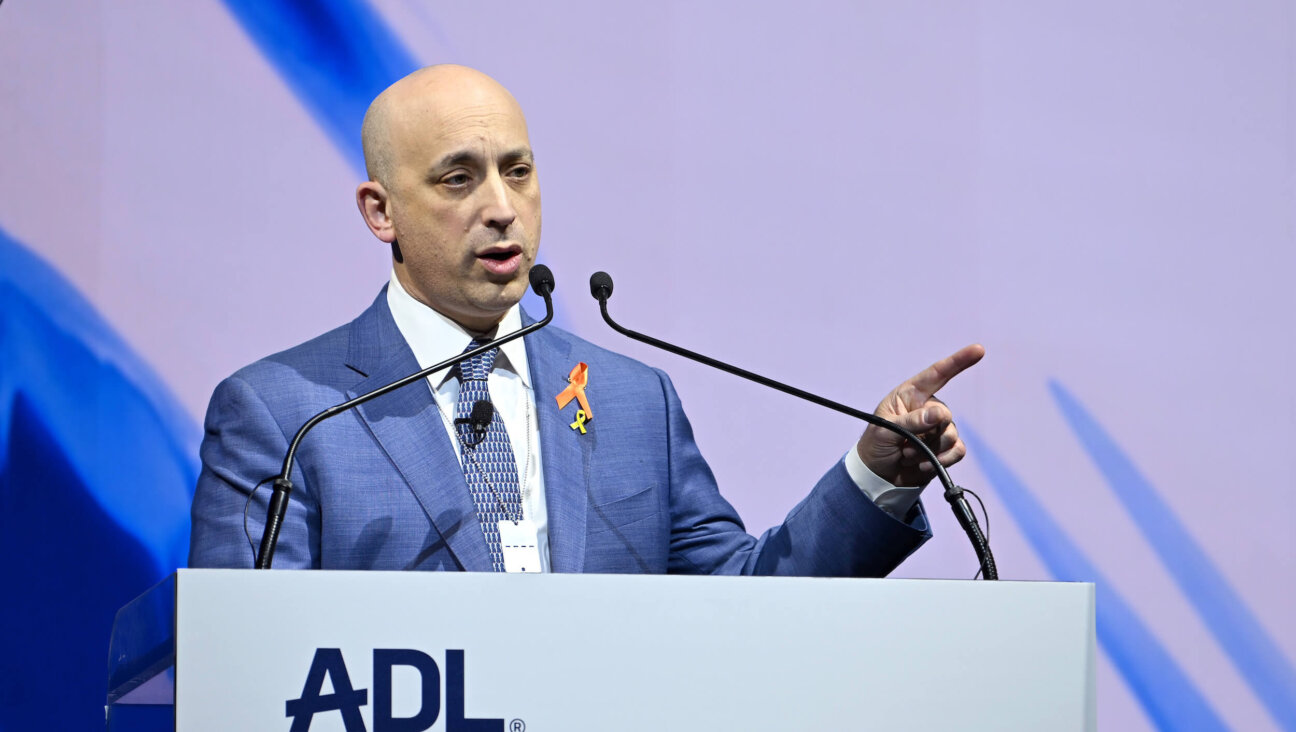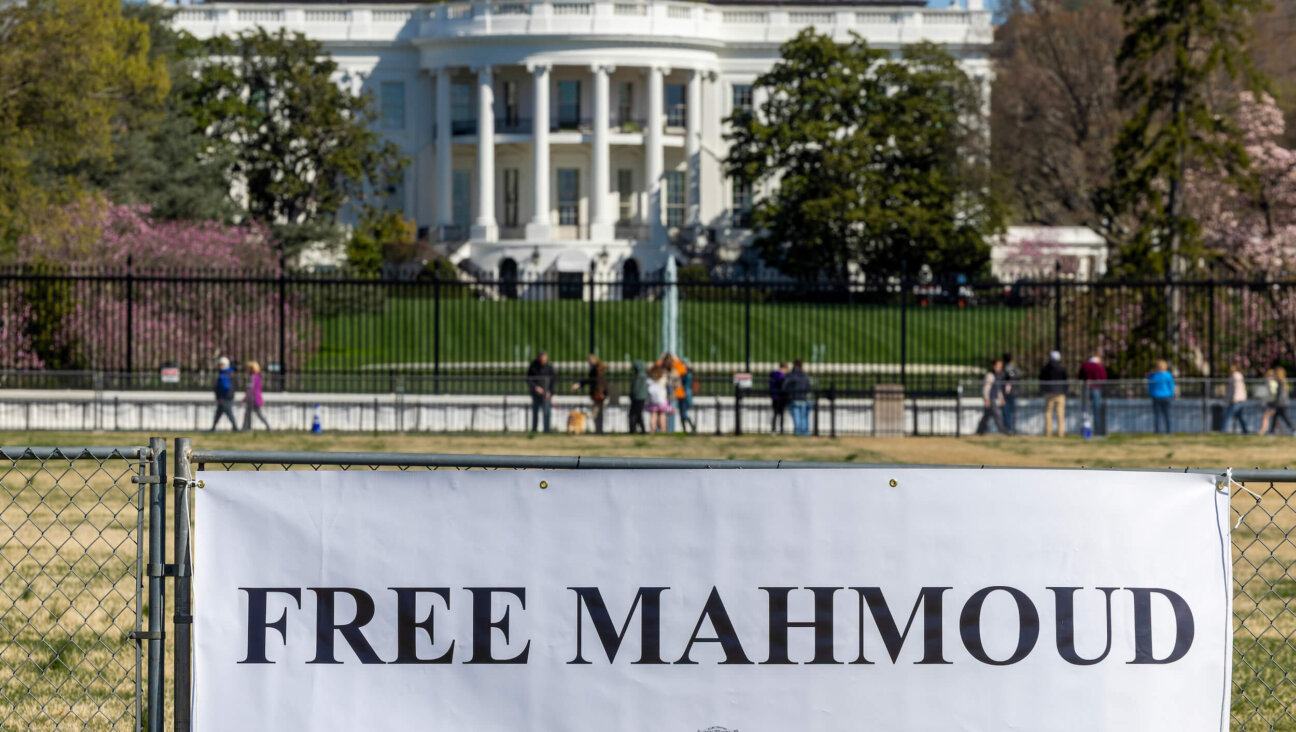‘No Alternative to Day Schools’: An Exchange
In our December 11 issue, the Forward published an opinion article from Rabbi Irving Greenberg titled “There Is No Alternative to Day Schools.” Lamenting what he sees as an increasing tendency in the Jewish community to look beyond day schools in favor of less expensive educational alternatives, Greenberg wrote: “I, too, wish there were a cheap, effective alternative to day schools — but there is not.”
“[O]nly day schools offer the tools to make a mature embrace of Judaism plausible for many of our young people,” argued Greenberg, former president of the Jewish Life Network and founding president of CLAL-The National Jewish Center for Learning and Leadership. He urged the Jewish community to step up its financial support for day schools and tuition-assistance in order to make day school education universally affordable and accessible.
The Forward invited a diverse group of scholars and Jewish education specialists to respond to Greenberg’s essay. They are published below — along with a response from Greenberg.
Meeting Families Where They Are
By Helene Z. Tigay
Rabbi Irving Greenberg states that there is no alternative to day schools. There is no doubt that day schools are the most successful venue for educating our children to become knowledgeable, committed Jews. However, much as we wish it were otherwise, a day school experience is just not in the cards for the majority of non-Orthodox Jewish families.
This is due to many significant factors, not simply the staggering cost. Factors that might cause parents to steer clear of day schools include commitment to public education; concern that children require a more varied school environment in order to live in a multi-ethnic, multi-religious and socio-economically diverse world; and a need to find the right environment for kids with special needs or special interests.
Indeed, the overwhelming majority of Jewish families who send their kids to Jewish schools send them to supplementary and synagogue schools, not day schools. Until recently, these schools have been widely maligned because they’ve damaged many kids’ feelings about being Jewish. Some have advocated their disappearance altogether, with Israel trips or Jewish camping offered as alternatives. But while both of these Jewish educational experiences are excellent venues for developing Jewish identity, they are peak experiences, and their impact tends to dissipate unless accompanied by a week-after-week, year-after-year Jewish educational context.
The Jewish community must not abandon the majority of its families. We have a moral responsibility to embrace these families and children “where they are.” To do so, we must not jettison synagogue schools but rather transform them so that they offer an energizing and compelling engagement with Jewish culture, tradition, language and history, involving families along the way. That, in concert with Jewish camping and Israel trips, will provide a well-integrated, viable and positive Jewish experience — even for those who, for whatever reason, cannot or will not take access a day school education.
Helene Z. Tigay is an independent educational consultant who works with PELIE: Partnership for Effective Learning and Innovative Education. She was the founder of the Philadelphia-based NESS: Nurturing Excellence in Synagogue Schools.
The Public Option
By Deborah Dash Moore and Mac Moore
Yesh breira. There is an alternative to parochial education. It is called public school.
Many Jews want our children to attend public school because of our commitment to this openly pluralistic democracy that we call home. We value diversity within our community and among communities.
Public school students and their parents practice democracy in an appropriate institutional arena. Retiring from the field is not an acceptable option in part because, left to their own devices, religions do not promote democratic interdependence. Together — physically together — diverse people must practice negotiating in good faith. In public school Jews and non-Jews learn to explain traditions and aspirations to one another.
Jewish teachers and parents bring vital historical awareness to public education. Think of high school curricula on the Holocaust; such changes get implemented and sustained from the inside.
Public school is not the only educational commitment on the table here. We need multiple ways of learning to live Jewishly in the United States, as Reform, Renewal, Reconstructionist, Conservative, Orthodox and, yes, as secular Jews.
Jewish families who desire parochial education advocate for crossover support. But Rabbi Greenberg takes this to another level. He’s pressing the commonwealth of American Jewish communities to put all its eggs in one basket. Even “with depleted resources,” federations “should raid their reserves and spend down.” Continuity is the gun held to our heads. Bet the bank because the end draws nigh in this “war for survival.” “The” research demonstrates anti-assimilation potency of day school prophylaxis, Greenberg asserts. Actually, although Orthodox affiliation effectively wards off intermarriage, it is not clear that non-Orthodox day schools lower intermarriage rates any more than other kinds of long-term, intensive Jewish education. “Bang for bucks” is less the issue here than differently balanced value systems.
Some Jews value the combination of supplementary Jewish education and Jewish support of public schooling. Promoters of parochial Jewish schools must neither covet the funding base and the enrollments of supplementary schools nor try to undermine Jewish engagement with public schools.
Deborah Dash Moore is director of the Frankel Center for Judaic Studies at the University of Michigan. Mac Moore teaches in the American Cultures and Judaic Studies programs at the University of Michigan.
The Publicly Funded Option
By Peter Deutsch
For decades, the Jewish community in America has been trying to increase the percentage of Jewish children who have a strong, deep and intellectually based Jewish education. I agree with Rabbi Greenberg that a day school education can provide that type of education.
However, after decades and hundreds of millions of dollars invested, only a small fraction of Jewish children go to Jewish day schools.
The efforts that Rabbi Greenberg mentions to increase or even stabilize the percentage of Jewish children in day schools are commendable and significant in relation to other present efforts. However, they are very modest in relation to the challenge.
There are now three Hebrew-English charter schools in the United States. The two in South Florida presently serve 715 children. At least two additional Hebrew-English charter schools are expected to open in South Florida next year. The State of Florida is providing $4,900,000 to operate the two schools this year. To put that number into perspective, that’s about as much money as the Jewish Federation of Broward County (which serves the county in which the two schools are located) raised in its annual campaign in a community of some 200,000 Jews during the last fiscal year. The record gift that Rabbi Greenberg mentions is for $11,000,000 for the entire United States (the grant is really only a $5,500,000 grant per year over two years and the grant is supposed to include scholarships for early childhood programs and residential summer camps).
A Hebrew-English charter school education is not a day school education. However, a student completing a K-12 Hebrew-English charter school would have a strong, deep and intellectually based Hebrew language, history and culture education. That student would also have had the opportunity to easily enhance his or her religious education outside the public school setting.
Peter Deutsch is founder of Ben Gamla Charter School, America’s first Hebrew-English charter school. He served as a member of Congress for 12 years.
Not by Charity Alone
By Jack Wertheimer
As savvy consumers, American Jews know that “you get what you pay for.” Day schools are the most expensive, demanding and time-intensive form of Jewish education. But because day schools have the time to immerse students in an enriched Jewish environment, they can develop students’ Hebrew language and prayer skills and expose students to the texts, history and living culture of Jewish civilization. They can develop Jewish character by socializing young Jews to Jewish norms of behavior — derech eretz, respect for others, and chesed, acts of kindness and giving. And, most important, day schools embed students in a Jewish environment where what is learned is also lived.
Unlike past generations of American Jews, we are blessed with a well-developed infrastructure of day schools in communities across the country. Tragically, as Rabbi Greenberg notes, high tuition costs have been a deterrent for too many families. Equally tragic, some are prepared to dismantle that infrastructure rather than devise creative ways to support day schools.
What we need is a communal will to do what is necessary to enable the minority of Jewish families seeking a day school education for their children to have that opportunity. That requires, as Greenberg urges, a serious re-ordering of communal funding priorities.
But I would also suggest that Jewish philanthropy alone cannot solve the crisis of day school affordability. In other Western countries, Jewish day schools receive direct governmental support for the general studies education. In America, parents who opt to send their children to day schools pay huge school taxes from which they can derive no benefit. Rather than find ways to remedy this situation, the organized American Jewish community remains passive. It is more zealous in its faith in the strict separation of church and state than in spending its political capital to help its own children receive the best possible Jewish education.
Jack Wertheimer is a professor of American Jewish history at the Jewish Theological Seminary. He is the editor of “Family Matters: Jewish Education in an Age of Choice” (Brandeis, 2007).
Public and Private Interests
By Richard D. Kahlenberg
Rabbi Irving Greenberg is concerned about preventing Jewish assimilation into the American mainstream. His solution is that Jewish individuals and philanthropists should finance Jewish day schools through private donations.
In America, every religious group — Jews, Muslims, Evangelicals, Catholics and others — has a constitutional right to use private funds to educate children outside of the public school system. What each of these groups does not possess is the right to use public taxpayer funds to encourage separate group identities or religious beliefs.
The fundamental purpose of public schooling is to teach children of all different backgrounds common American values and what it means to be an American. As Albert Shanker, the great teacher unionist and educator (who happened to be Jewish), noted, “the public schools, more than any other institution in our society… have brought together different groups — groups which in other societies would have been at war with each other — and taught them to respect and work with each other.”
Personally, I think all Americans would suffer if various religious and ethnic groups withdrew en masse into private education, even though they have a right to do so. But I’m pleased that Rabbi Greenberg does not ask in his article for government to pay for Jewish education, in contrast to efforts to start Hebrew charter schools or to gain government vouchers for private education. Using public funds for schools that cater to specific groups dangerously undercuts the unifying purpose of public education.
Richard D. Kahlenberg is a senior fellow at the Century Foundation and author of “Tough Liberal: Albert Shanker and the Battles Over Schools, Unions, Race and Democracy” (Columbia University Press, 2007).
Rabbi Irving Greenberg responds:
Regarding Helen Tigay’s and Deborah Dash Moore and Mac Moore’s responses to my essay, I want to be clear: I wrote that there is no cheap equivalent to day schools — and that the community that wants to live must pay up, whatever the cost. I did not say that we should abandon synagogue or supplementary schools.
Still, the vast majority of Hebrew school alumni had bad experiences, and their intermarriage and assimilation rates are high. We owe it to parents to tell them this truth: Taking inadequate medicine will not guarantee your children healthy Jewish identities.
We should help those who wise up and want to switch to day schools by bringing down tuition costs. At the same time, we must invest serious money to enrich synagogue schools in the hope that they can make a positive difference. I salute projects like PELIE and NESS, and I have solicited funds for them. I hope they will succeed, but I also believe that supplementary schools will never match the impact of day schools.
After two decades of significant growth, day school students now represent perhaps a fifth of school-age Jewish children. The bulk of those enrolled in Jewish day schools may be Orthodox children, but I believe the non-Orthodox share of day school students is underestimated because many children in modern, centrist and Chabad Orthodox day schools come from non-Orthodox families.
Non-Orthodox day school graduates do better than their peers who do not go to day schools in terms of in-marriage and Jewish identity; they can be leaders in strengthening the Jewish identities of others. We don’t need 100% of children to go to day school. Day school graduates are like the 10% of steel or chemicals added to cement that strengthen the total mix enormously. We need to increase the proportion of non-Orthodox children going to day school. Better quality is key to attracting them. That takes money.
Peter Deutsch correctly points out that major government funding can strengthen Jewish education. The problem with charter schools is that to qualify for government funding, the community must strip out the Jewish content, religion, values and advocacy from the educational program. I fear that such schools will fail to transmit Jewish identity. Perhaps such schools can succeed when supplemented with Hebrew school education or Jewish camping. Therefore, I favor this experiment. Unfortunately, the most likely outcome is that charter schools will teach the language but lose the identity battle.
I absolutely agree with Jack Wertheimer that government support is needed in addition to community money. I support vouchers. A voucher of $2,000 per day-school student, usable only for general studies, would result in more than $400,000,000 in new money annually for Jewish education.
I left this issue out of my original article because there is a fierce debate about this issue in the Jewish community, and I could not do justice to the topic in the course of a brief article on the need for redirecting community funds toward reducing the cost of day school tuition.
The Moores and Richard Kahlenberg are committed to public schools for the sake of strengthening democracy. Kahlenberg, in principle, is against government funds being used for strengthening religious or ethnic identity.
In fact, Jews come out of modern day schools as committed to democracy as any public school graduates. Furthermore, Jewish numbers are so small that Jewish students are not sufficient to save or upgrade public school education.
I believe that the British and some Canadian provinces’ models of religion-state relations, which allow for support of multiple religions’ schools, are just as legitimate as the current American model, and yield equal democratic outcomes. In fact, a mix of parochial, private and public schools is more pluralistic than a dominantly secular public system alone. We need plural values and standards to maximize democracy. Religious schools can contribute to this variety.
I am willing to take the risk that some religious groups will use public money and teach a sectarian ethos that “others” other groups — and Jews in particular. This risk should be monitored and prevented or reduced.
Fundamentalist liberals will place their conception of democracy as the highest value and shun day schools. As I said above, I don’t believe that this will meaningfully help public schools — or democracy — to flourish. Furthermore, the desired social mixing can occur in college and in the workplace.
Those who make it their highest priority to assure the Jewish future will reject the liberal fundamentalist view and support government aid. They will be rewarded with more Jewish education and more pluralism.
I reiterate my main point: The Jewish community must increase its financial support for Jewish education massively. Day schools, camps, Birthright Israel — the vehicles that work best — should get priority. But all forms of education should be helped. Where and when there is a will to do whatever is necessary to nurture a mature Jewish identity — the kind needed in an open society — a financial way will be found.
Rabbi Irving Greenberg is past president of the Jewish Life Network and was the founding president of CLAL-The National Jewish Center for Learning and Leadership.
The Forward is free to read, but it isn’t free to produce

I hope you appreciated this article. Before you go, I’d like to ask you to please support the Forward.
At a time when other newsrooms are closing or cutting back, the Forward has removed its paywall and invested additional resources to report on the ground from Israel and around the U.S. on the impact of the war, rising antisemitism and polarized discourse.
Readers like you make it all possible. We’ve started our Passover Fundraising Drive, and we need 1,800 readers like you to step up to support the Forward by April 21. Members of the Forward board are even matching the first 1,000 gifts, up to $70,000.
This is a great time to support independent Jewish journalism, because every dollar goes twice as far.
— Rachel Fishman Feddersen, Publisher and CEO
2X match on all Passover gifts!
Most Popular
- 1

News A Jewish Republican and Muslim Democrat are suddenly in a tight race for a special seat in Congress
- 2

Fast Forward The NCAA men’s Final Four has 3 Jewish coaches
- 3

Fast Forward Cory Booker proclaims, ‘Hineni’ — I am here — 19 hours into anti-Trump Senate speech
- 4

Film & TV What Gal Gadot has said about the Israeli-Palestinian conflict
In Case You Missed It
-

Opinion I co-wrote Biden’s antisemitism strategy. Trump is making the threat worse
-

Fast Forward From ‘October 8’ to ‘The Encampments,’ these new documentaries illuminate the post-Oct. 7 American experience
-

Fast Forward Jews at Tufts are furious over ICE seizing a pro-Palestinian grad student. But they’re wary of joining protests for her.
-

Film & TV How Marlene Dietrich saved me — or maybe my twin sister — and helped inspire me to become a lifelong activist
-
Shop the Forward Store
100% of profits support our journalism
Republish This Story
Please read before republishing
We’re happy to make this story available to republish for free, unless it originated with JTA, Haaretz or another publication (as indicated on the article) and as long as you follow our guidelines.
You must comply with the following:
- Credit the Forward
- Retain our pixel
- Preserve our canonical link in Google search
- Add a noindex tag in Google search
See our full guidelines for more information, and this guide for detail about canonical URLs.
To republish, copy the HTML by clicking on the yellow button to the right; it includes our tracking pixel, all paragraph styles and hyperlinks, the author byline and credit to the Forward. It does not include images; to avoid copyright violations, you must add them manually, following our guidelines. Please email us at [email protected], subject line “republish,” with any questions or to let us know what stories you’re picking up.














